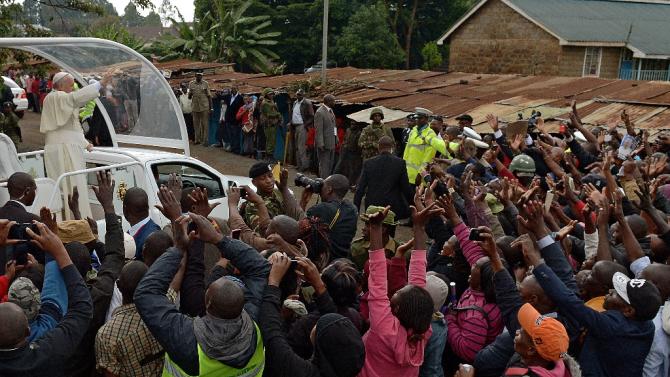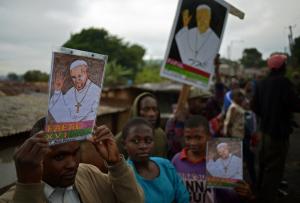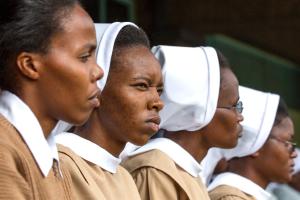Date: Fri, 27 Nov 2015 13:58:52 +0100
By Jean-Louis De La Vaissiere and Cyril Belaud
Nairobi (AFP) - Pope Francis lashed out at wealthy minorities who hoard resources at the expense of the poor as he visited a crowded Nairobi slum on Friday, wrapping up the first leg of a three nation tour.
The 78-year-old pontiff was given a rapturous welcome as he arrived in Kangemi, which is home to more than 100,000 people who live in shacks without sewerage, including 20,000 who belong to the local Catholic parish.
"These are wounds inflicted by minorities who cling to power and wealth, who selfishly squander while a growing majority is forced to flee to abandoned, filthy and run-down peripheries," he told crowds in the slum on the outskirts of the Kenyan capital.
Wild singing and ululating erupted as Francis arrived in Kangemi, his popemobile weaving through a sea of tin-roofed homes in one of the most anticipated parts of his three-day visit to Kenya.
"I am here because I want you to know that I am not indifferent to your joys and hopes, your troubles and your sorrows," Francis told the packed congregation at the Church of St Joseph the Worker, denouncing the "dreadful injustice of urban exclusion".
"I realise the difficulties which you experience daily. How can I not denounce the injustices which you suffer?"
People arrived long before dawn in the hope of catching a glimpse of the pope, who has made humility and help for the impoverished a hallmark of his tenure.
He went on to meet young people at Kasarani national stadium, where US President Barack Obama gave a keynote speech in July.
- 'Corruption like sugar' -
There, thousands of smiling youngsters whooped, cheered and danced as the tiny white-clad figure entered the stadium setting off lively celebrations.
Even politicians joined in, with Kenyan President Uhuru Kenyatta leading a group of black-and-magenta clad priests an impromptu "conga" line as grinning spectators gawped from the stands.
The pope delivered another hard-hitting address focusing on corruption and the radicalisation of young people.
"Corruption is something which eats (you) inside. It is like sugar. Sweet. We like it. It is easy," he said of an issue which is of widespread concern in this east African country that has come in for sharp international criticism over runaway graft.
"After, we finish up in a bad way... So much sugar that we either end up being diabetic, or our country ends up diabetic," he warned.
"Please don’t develop that taste for that sugar which is called corruption."
He also spoke of the dangers of young people being drawn into radical extremism, saying "education and work" was the key to stopping it.
"They leave their friends, their tribes, their countries. They leave their lives behind in order to kill," he told the crowd.
"The first thing we have to do to stop a young person being recruited is education and work. If a young person has no work, then what future awaits him?
"It is a social danger, which is beyond us... because it depends on an unjust international system that which is not centred on the person but on the god of money."
- Uganda moves against NGOs -
After arriving in Nairobi late on Wednesday on his first visit to Africa, the pope celebrated a giant open air public mass, using his public appearances to speak forcefully about the dangers of radicalisation and climate change.
He also issued a stark environmental message, warning it would be "catastrophic" if agreement is not reached at a key UN climate summit which opens in Paris on Monday.
"We are confronted with a choice which cannot be ignored: either to improve or to destroy the environment," he said in a speech at the world headquarters of the UN's Environment Programme.
Later Friday, Francis will fly to Uganda where he will spend two days before continuing on to Central African Republic, a country wracked by sectarian conflict.
On the eve of his arrival, Ugandan MPs passed a controversial bill that would give authorities sweeping powers to regulate civil society, which rights groups say will "strangle" criticism of the government.
The legislation would grant Uganda's internal affairs ministry the power to supervise, approve, inspect and dissolve an organisation if it was "in the public interest" in a move which could even see rights activists jailed for documenting abuses.
Human Rights Watch has said the implications were "terrifying".
Security has been ratcheted up for the visit over fears Islamist rebels from Al-Qaeda's East Africa branch, the Shebab, could the opportunity to stage attacks.
But Francis has shrugged off safety fears, joking that he was "more worried about the mosquitoes".


